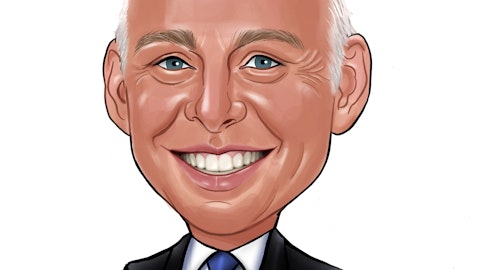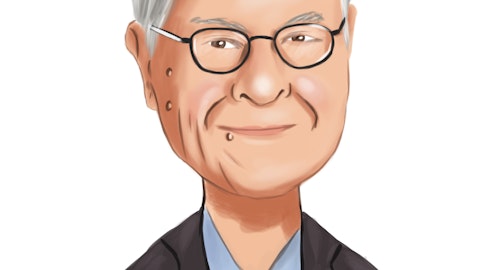Jeremy Hoff: So it’s interesting, Budd. It’s a really good question. So what I’ve observed and what I’ve — things I’ve heard is, it seems like the type of model that each customer is really flowing their inventories through has a lot to do with what position they’ve been in from an inventory standpoint. So the larger customers, of course, they’re bringing in containers. They’re bringing in larger positions of inventory. So those are more difficult to just turn around quickly. So the model of container and case goods, I would say, has been the toughest model across our industry. As you get into domestically inventory position by manufacturers where they can buy anything kind of 1 at a time, that model has been less disruptive because you could fit — you could actually get some orders into some places that didn’t have the situation I just described, which was typically probably more of a medium to smaller customer, also interior designers and of course, e-commerce.
Then if you get into another segment, which is domestically made upholstery, that again, that was probably, in my opinion, the most advantaged place to be throughout the situation we’ve all been in, for all the reasons I just stated from an inventory position. It’s — a lot of it’s custom order. A lot of it’s 1 at a time. So really, the different models, kind of, in my opinion, determined what type of position each retailer was in.
Budd Bugatch: And going — digging down on that in Labor Day, which you may have heard, and I realize it’s only anecdotal at this time. What are you — are you hearing any differences in how the demand is coming back to these retailers and to the various classes of retailers and the health of the inventories you mentioned, I think that the inventory seems to be — do you think you’ve seen the end of destocking. So how are inventories at retail and among the majors, obviously, because the smaller guys would offer, as you said, order one by one. So when we…
Jeremy Hoff: We believe they’re getting in a much better position, but I think Labor Day, we’re going to find out if that really put them over the — over that line of feeling better about ordering more products. I think a lot of that has affected producers overseas. Of course, it’s been slow. And in my opinion, and it’s just strictly my opinion, I think that there will be some maybe overreaction in letting inventories get possibly too low. And then there might be, okay, how do I get things quick enough and we may be in a little bit of a bottleneck towards the end of the year? I don’t know this, by the way, I’m just telling you what I think may happen.
Budd Bugatch: Oh, well, we’ve seen it before in the industry. That’s happened before…
Jeremy Hoff: Right, right. Exactly.
Budd Bugatch: When you look at sales on a comparable basis, I realize we’ve got the ACH discontinuation. We’ve got some other things. How does it look on a same kind of same location basis segment by segment or overall company?
Jeremy Hoff: So I want to make sure I understand your question. Are you are you asking how we’ll look across the different businesses now that ACH and the clubs business and whatnot are gone?
Budd Bugatch: Well, I’m not looking at the future, looking at the quarter or at year-to-date, how was it on that basis with taking out the discontinued operations or the things that you — the initiatives that you are paring back. So I’m sure you look at it on a kind of a comparable basis, as well as an overall consolidated basis.
Jeremy Hoff: Yes. So ACH would have been $8 million to $10 million of that picture. I don’t have the exact number you’re looking for, but we’d be happy to jump on a call and figure that number out and give it to you later.
Budd Bugatch: That would be great. And when you look at — you’ve talked about the destocking with the majors and the way you flow goods. You’ve got probably maybe the largest — 1 of the larger import businesses as well. So what are you seeing — you talked about, I think, before you’re going to try and move away from your sourcing from China. And obviously, that’s a big issue in society in the country. What are you seeing — what’s your progress on that? And what’s the health of your suppliers in the Pacific rim?
Jeremy Hoff: We feel really good about the health of our suppliers overseas. We’re less than 10% now in China. We were as much as, I believe, I think we’re around 35% at 1 point in China. So we’ve made a significant reduction in that. Also, a major improvement for us that we haven’t talked about is the number of factories we used to deal with when we had the clubs business when we had Accentrics Home when we had we had RTA, I mean, just to give you an idea, just Accentrics Home at over 60 factories. So when you think about the people we have overseas, which is a really pretty substantial team, but them being able to focus on the number of factors we have now, which is we feel the correct number for our business, and it’s not spreading out our team because we have quality and other individuals that have to be in those factories. So as you do that, you lose sight and focus on the things that actually matter, which is a big benefit to what we’ve done as well.
Budd Bugatch: So Vietnam now the largest of your supply countries?
Jeremy Hoff: Yes.
Budd Bugatch: Okay. And last for me would be HMI. Any other actions you’re contemplating here that you can talk about? Obviously, if you’ve got some that may affect people, you probably can’t talk about it, but — any other things strategically that you see do you think they need to do with Home Meridian?
Jeremy Hoff: No our — the nice thing about Home Meridian at this point is it’s just we need to grow, and we’re focused on growing Pulaski, growing Samuel Lawrence, PRI and also our hospitality division. And we have a lot of things, as we mentioned, over 1,000 store placements going out between — right before this call and after which is going to, we believe, feed a lot of future revenues for HMI. And because as we mentioned, the overhead — the breakeven point for HMI is such a different place now — that’s why we feel so confident about how we’re going to do within that business for the future.
Budd Bugatch: And I would have thought hospitality would have been a real strong point during the quarter with what’s going on in the country. Is that true?
Jeremy Hoff: Budd, I missed the first part of your question, I’m sorry.
Budd Bugatch: I would say hospitality should have been — I would think, would have been very strong during the quarter.
Jeremy Hoff: Yes, definitely bright spot. It was definitely a bright spot for us. Also the H Contract, which is focused on senior living was another bright spot for us throughout the quarter.
Budd Bugatch: Thank you very much. I’m sorry [Indiscernible]





